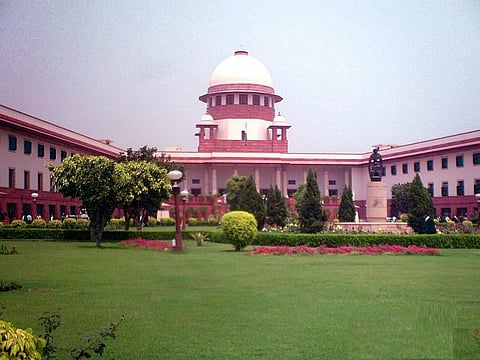
- Home
- न्यूजग्राम
- NewsGram USA
- India
- World
- Politics
- Entertainment
- Culture
- Lifestyle
- Economy
- Sports
- Sp. Coverage
- Misc.
- NewsGram Exclusive
- Jobs / Internships

By NewsGram Staff Writer
The Supreme Court on Thursday declared that freedom of speech and expression has "constitutional limitation attached to it" and it has to be given a broad canvas. This right cannot be exercised to attribute obscene expletives to "historically respected personality" such as Mahatma Gandhi.
A bench of Justices, Dipak Misra and Prafulla C. Pant, said, "Freedom of speech and expression has to be given a broad canvas, but it has to have inherent limitations which are permissible within the constitutional parameters."
"We have already opined that freedom of speech and expression as enshrined under Article 19(1)(a) of the Constitution is not absolute in view of Article 19(2) of the Constitution," they added.
"We reiterate the said right is a right of great value and transcends and with the passage of time and growth of culture, it has to pave the path of ascendancy, but it cannot be put in the compartment of absoluteness. There is constitutional limitation attached to it," the bench said.
The bench set these standards while hearing the plea of Devidas Ramachandra Tuljapurkar, editor and publisher of a bulletin magazine of All India Bank Employees Association, who was charged with publishing the "obscene" Marathi poem titled Gandhi Mala Bhetala (I Met Gandhi) authored by Vasant Dattatray Gujjar in which Gandhi's character was ridiculed. The poem was published in 1994 in an in-house bank magazine.
The apex court said in its judgment:
"When the name of Mahatma Gandhi is alluded or used as a symbol, speaking or using obscene words, the concept of "degree" comes in. To elaborate, the "contemporary community standards test" becomes applicable with more vigour, in a greater degree and in an accentuated manner. What can otherwise pass of the contemporary community standards test for use of the same language, it would not be so, if the name of Mahatma Gandhi is used as a symbol or allusion or surrealistic voice to put words or to show him doing such acts which are obscene."
The contemporary community standards test is a parameter for adjudging obscenity, and in that context, the words used or spoken by a historically respected personality is a medium of communication through a poem or write-up or other form of artistic work gets signification, the top court said.
"We have already opined that by bringing in a historically respected personality to the arena of section 292 IPC, neither a new offence is created nor an ingredient is interpreted," the court said. "In the context of obscenity, the provision enshrined under the Indian Penal Code's section 292 (sale, etc., of obscene books, etc.) has its room to play," Justice Pant added.
In 1994, after watching the poem in bank premises, Patit Pawan Sanghtan had filed the complaint against the publisher and the author of the poem. Both the trial court and the Bombay High Court declined to unsaddle them of the obscenity charge although they were charged of creating enmity between different sections.
